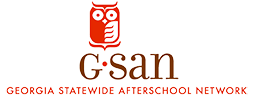
Afterschool and summer learning programs can close educational and opportunity gaps, support the positive development of the whole child, and can be a key strategy to improving child wellbeing. These programs can keep youth safe, healthy, and provide opportunities for them to develop new skills. The stimulating environments afterschool and summer learning programs provide are filled with positive and supportive relationships, which foster connection and support adolescent brain development and learning.[1] Unfortunately, The America After 3pm survey shows in Georgia, for every child in an afterschool program, 2 more are waiting to get in, with 238,265 children alone and unsupervised after school.[2]
View the Map
GSAN has partnered with Neighborhood Nexus to create an interactive map that paints a picture of how access to government-funded afterschool and summer learning intersects with other indicators of child well-being in Georgia. This map can be used by policymakers, stakeholders, and state and local leaders to visualize where the need for programming is greatest and allow for targeted action that will allow children to thrive. Providers and advocates can use the map to identify gaps in programming and raise awareness for the impact of and need for additional programming.
Click Here to View the Map!About the Map
This map includes the afterschool and summer learning programs that receive funding from the following government source:
- The Building Opportunities in Out-of-School Time (BOOST) Grants program, funded through the American Rescue Plan Act, directs $85 million in grants to afterschool and summer learning in Georgia. The Georgia Statewide Afterschool Network in partnership with the Georgia Department of Education administers this program. The three-year grants, renewed annually, are awarded to organizations that operate comprehensive out-of-school time programming year-round, over the summer months, or after school during the academic year, with the goal of providing evidence based afterschool and summer enrichment programming for youth most impacted by the COVID-19 pandemic.
- The Out of School Services Program is located within the Georgia Division of Family & Children Services (DFCS), Well-Being Services Section, and provides $15.5 million in federal funding via TANF to non-profit organizations and public agencies who serve youth and families during the out-of-school time. The mission of this program is to provide resources to youth-serving organizations within the state of Georgia who serve families within low-to-moderate income communities and the foster care system.
- The 21st Century Community Learning Centers (CCLC) program is the only federal funding stream dedicated to afterschool, before school, and summer learning. The mission of the 21st CCLC program is to provide opportunities for academic enrichment and tutorial services to help students, offer them a broad array of additional services, programs, and activities that are designed to reinforce and complement the regular academic program; and offer families of 21st CCLC students opportunities for active and meaningful engagement in their children’s education. It provides resources to organizations that serve populations of students in which 40 percent or more are eligible for free or reduced-price meal status or target their services to schools identified by the state as being in need of support.
- The Learning Loss grants are funded via $4.7 million from state revenue allocated to the FY22 budget by the Georgia General Assembly. The Georgia Division of Family & Children Services and the United Way of Greater Atlanta administered these grants to organizations who provide programming to reduce learning loss for Georgia’s youth. Strategies supported by the grant include building reading skills, improving math fluency, supporting school transition, strengthening family engagement, learning acceleration, and increasing access to quality out-of-school time programs.
